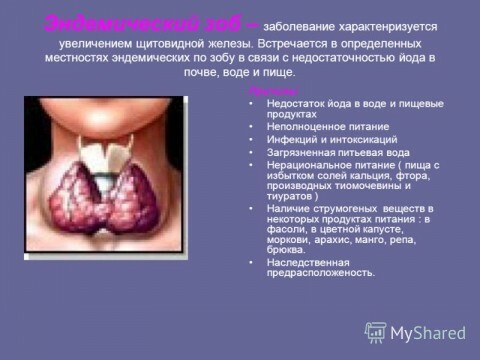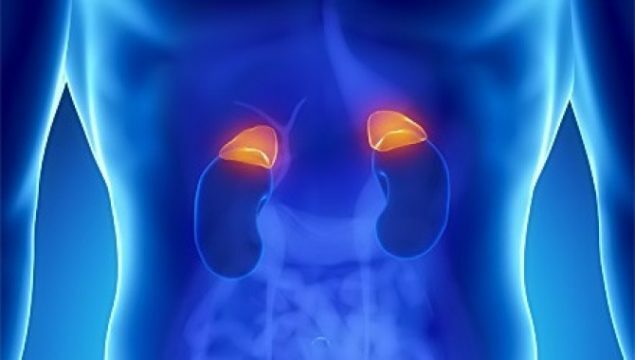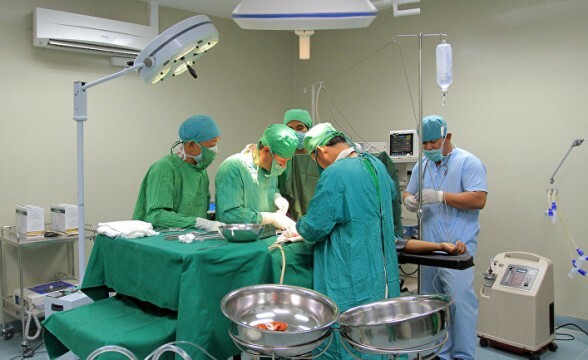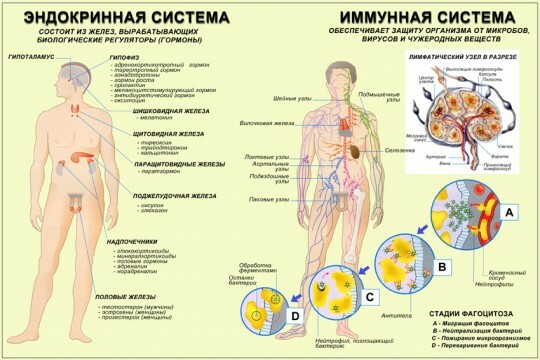The thyroid gland is located between the tracheal rings and the thyroid cartilage on the front surface of the neck. It produces a synthesis of thyroid hormones, which affect the metabolism in all organs and tissues. The synthesis processes depend on the state of the hypothalamic-pituitary brain system, the amount of iodine in the consumed food, the general health of the organism, hereditary factors, and the like. Any violation in one of the links of the gland may lead to a violation of its activity and to a change in the hormonal background.
Classification of goiter
Under the definition of goiter fall any changes in the thyroid gland associated with an increase in its size. Classification makes it possible to understand the relationship between the cause, which entailed the increased growth of the gland, and the feature of the function violation.
Depending on the change in the amount of hormones produced, three types of goitre are distinguished:
- hypothyroid( with a decrease in the synthesis of thyroid hormones);
- is euthyroid( without changing the hormonal balance);
- hyperthyroid( with an increase in the thyroid hormone content);
Depending on the morphological changes, the following are distinguished:
- Colloid goiter:
- diffuse goiter;
- nodal;
- mixed form( diffusive-nodular);
- Parenchymal goiter.
The degree of increase is:
- 0 degree - no increase;
- 1 degree - can be detected by palpation examination;
- 2 degree - increase visible to the naked eye;
Hypothyroid form of goiter
Hypothyroid goiter is associated with the concept of endemic goiter associated with a deficiency in iodine intake. This disease is caused by the peculiarity of the organism to adapt to the unfavorable conditions of the endemic region. For the enhanced capture of iodine from the bloodstream, with its deficiency, the pituitary gland enhances the production of thyroid-stimulating hormone, which is the stimulus for the uncontrolled increase in glandular tissue. However, the same state of hypothyroidism with the formation of cysts is sometimes provoked:
- genetic predisposition;
- age-related changes;
- autoimmune reactions( Hashimoto's thyroiditis in advanced stages);
- surgical interventions on the neck.
Symptoms of endemic goiter

The clinic and the rate of progression of the disease depend on the degree of iodine deficiency. It is more common in young women. The first symptom is an increase in the thyroid gland in size, it can be either uniform, with diffuse lesions, or uneven, with the development of the nodal form. At first, the hormonal background does not change due to adaptation and there is a phenomenon of euthyroid goiter, but there may already be a feeling of pressure and raspiraniya in the gland, "coma" in the throat, hoarse voice without catarrhal phenomena.
Gradually the state of hormonal balance is violated towards hypothyroidism, which causes a group of new symptoms:
- slowing the reaction, weakness, lethargy;
- menstrual irregularities in women;
- decreased reproductive capacity;
- constipation;
- set of body weight;
- chilliness even in warm weather;
- increased incidence of ARI;
- in case of iodine deficiency in early pregnancy, a child may develop cretinism;
Treatment of goiter with hypothyroidism phenomena
Treating thyroid goiter should be started only after the necessary diagnostic measures that confirm the presence of this disease. With its endemic nature, iodine preparations are prescribed. At home, iodine supplementation in the body can adjust the diet in such a way that it has more seafood, fruits and vegetables( especially persimmons, cucumbers, potatoes, garlic), but this method is good for the prevention of goiter in endemic regions. Among folk methods of treating endemic goiter at home is the use of tincture of walnuts, decoctions of juniper berries, St. John's wort, bitter wormwood. .. However, it is necessary to adequately assess the degree of the disease and understand that home treatment can be carried out only at the initial stages of the disease. In the case of pronounced signs of hypothyroidism, hormone replacement therapy is shown on a permanent or temporary basis. The main drugs are levothyroxine and eutirox. Do not rely on treatment at home, without concomitant therapy of pronounced effect even at 1 degree of gland enlargement. In severe forms of colloid goiter, violation of the function of adjacent structures, surgical treatment with excision of nodes or the entire gland is used.
Euthyroid goiter form

This form of the disease does not represent a clear danger to the patient and has a second name - nontoxic goiter. Most often, the symptoms are limited to an increase in the volume of the gland, which is usually represented by a cystic proliferation of glandular tissue with colloidal contents. Can be accompanied by unpleasant sensations in the neck. Among the reasons are:
- iodine deficiency( with the subsequent transformation into a hypothyroid form);
- smoking;
- use of certain medicines;
- old age;
- heredity.
Treatment of euthyroid goiter
Euthyroidism does not require intervention in the hormonal system. In the absence of complaints and the normal level of iodine in the body, treatment may not be prescribed at all. In such cases it is recommended to control the activity of the thyroid gland, its periodic examination, for the timely diagnosis of pathological changes. With a significant degree of growth of the gland, it is recommended that it be excised with subsequent hormonotherapy.
Hyperthyroid goiter form
The most common form of hyperthyroid goiter is diffuse toxic goiter, also known as Graves' disease or Based's disease. It also refers to colloidal forms of changes in the structure of the thyroid gland. The enlargement of the gland occurs due to the hypersecretion of the colloid, from which the concept of colloid goiter occurs, and rarely due to the growth of the stroma and parenchyma of the organ. Young women are more prone to this pathology than men, and children rarely get sick. In addition to the increase in size, this disorder is characterized by hyperproduction of thyroid hormones by the gland, which disrupts metabolism. Among the causes of colloid goiter, hereditary predisposition, stressful situations, neuropsychic upheavals, autoimmune diseases come to the fore.
Symptoms of Basidic Disease
There are a number of characteristic symptoms and signs that make it possible to guess the given disease:
- increasing irritability;
- enlargement of the thyroid gland;
- tachycardia without objective reasons;
- trembling limbs and eyelids;
- poor heat tolerance;
- general weakness;
- weight loss;
- mental disorders( more common in women);
- exophthalmos;
- more frequent stools;
- in women with menstrual irregularities;

The final diagnosis is established on the basis of examination by a specialist, as well as thyroid hormone and thyrotropin. Colloid goiter is less susceptible to malignancy, so that biopsy and puncture of the nodes is by far not an obligatory procedure.
It should be differentiated from Based's disease with autoimmune thyroiditis( Hashimoto's disease), which is distinguished by the cause, structure, and also the method of rational treatment.
Causes of Hashimoto's goiter development
Development of Hashimoto's autoimmune thyroiditis is often associated with:
- with an advanced infectious disease;
- injury;
- operation on the thyroid gland;
- by exposure to ionizing radiation.
In the blood there are autoantibodies, the detection of which helps in the diagnosis of this disease.
Symptoms of Hashimoto's disease
- Initially, there may be an increase in the thyroid gland( in the case of atrophic forms of the Hashimoto's goiter it is possible to reduce it in size), but its dense consistency with characteristic nodularity and moderate soreness attracts attention.
- Just worried about unpleasant sensations when swallowing, there may be difficulty breathing.
- The process is accompanied by signs of hyperthyroidism( tachycardia, eyelashes, weight loss. ..), this is due to the destruction of the thyroid follicles and the release of a large amount of the hormone containing the colloid.
- Gradually, the gland tissue in Hashimoto's disease completely reorganizes, loses its former structure, the colloid goiter is transformed into a parenchymal strand, which leads to symptoms of hypothyroidism.
Treatment of goiter with hyperthyroidism
- In both colloidal and parenchymal( Hashimoto) goiter, hyperthyroidism is prescribed thyreostatic drugs, for example, mercazolil or tyrosol.
- With severe tachycardia and trembling in the hands, adrenoblockers( nebivolol, atenolol, atenobene, etc.) are prescribed, lithium carbonate can be used in combination to reduce the activity of glandular tissue.
- Immunomodulatory therapy is necessary for toxic goiter, however high dosages should be avoided, thymalin, zymosan, t-activin and others should be used.
- When a threat of malignant tumors develops, the nodular colloid goiter can be treated with radioactive iodine.
- Symptomatic treatment of insomnia, anxiety, irritability can be carried out at home with the help of herbal tinctures with sedative effect( valerian, motherwort, elephant. ..).
- Hashimoto's thyroiditis in the acute stage requires the appointment of corticosteroid preparations in combination with its treatment, and immunomodulating agents are contraindicated.
- With rapid-progressive cystic forms of goiter, the 2nd degree of enlargement and compression of adjacent tissues, surgical intervention is indicated.
- A good effect in the Hashimoto's goiter gives the intake of selenium-containing additives.
There are a lot of recipes for various lotions, tinctures, broths based on herbs, but it should be remembered that the treatment of folk remedies at home never gives a full recovery and can only be used in conjunction with medications.



